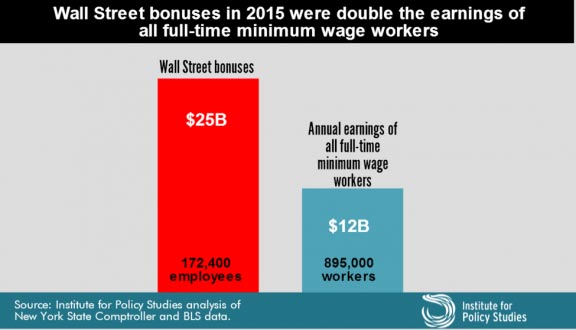
Truthout is a vital news source and a living history of political struggle. If you think our work is valuable, support us with a donation of any size.
Wall Street bonuses dipped a bit last year, but a new Institute for Policy Studies report puts the bonus figures in perspective by comparing the Wall Street payout to low-wage workers’ earnings.
According to new figures from the New York State Comptroller, Wall Street banks handed out $25 billion in bonuses to their 172,400 New York City-based employees last year. That amounts to double the combined earnings of all 895,000 Americans who work full-time at the current federal minimum wage of $7.25 per hour.
The average Wall Street bonus did decline last year, by 9 percent. But the 2015 bonus average of $146,200 still stood 4 percent higher than the average in 2009, the last time Congress increased the federal minimum wage.
For Wall Street employees, annual bonuses come as an extra reward on top of their base salaries, which averaged $404,800 in 2014. Top Wall Street executives can also receive, on top of salary and bonus, massive stock option and restricted stock grants.

Wall Street bonuses have now doubled the combined earnings of America’s full-time minimum wage workers for two years in a row. The overall bonus pool total did drop in 2015. But so did the number of full-time minimum wage workers. According to the most recent U.S. Bureau of Labor Statistics data, 895,000 people were working full-time at the minimum wage in 2014, down from 1,007,000 in 2013.
This dropoff in the number of people working at just the minimum wage reflects the increasing effectiveness of living wage campaigns in many states and cities. Yet 42 percent of American workers still earn less than $15 per hour, the wage level needed to cover basic living costs in most areas of the country, according to the National Employment Law Project.
The Wall Street bonus pool has become so large that in 2015 it would’ve been enough to have lifted all of America’s 2.6 million fast food prep and serving workers up to $15 per hour — and still have had $4 billion left over. Or that bonus pool could have raised to $15 the hourly wage of all our nation’s 1.6 million home care aides or all of our 2.6 million restaurant servers and bartenders.

Wall Street bonus payouts don’t just violate basic norms of fairness. The financial industry’s bonus culture has encouraged the sorts of high-risk behaviors that led to the 2008 financial crisis. And these bonuses also give the American economy far less bang for the buck than would pay raises for the low-paid workers who prepare our food and take care of our vulnerable.
To meet basic needs, these low-wage workers tend to spend nearly every dollar they earn, creating beneficial economic ripple effects. The wealthy, by contrast, can afford to squirrel away more of their earnings. The Wall Street bonus season may coincide with an uptick in luxury goods sales, but a minimum wage hike would give America’s economy a much greater boost.
Under the Dodd-Frank financial reform legislation, regulators were supposed to take action to rein in Wall Street pay nearly six years ago. Section 956 of that 2010 legislation prohibits financial industry pay packages that encourage “inappropriate risks.”
In 2011, regulators issued a proposed rule that ignored key lessons from the last half-dozen years of financial scandals. Their proposal would only apply pay restrictions to top executives, leaving off the hook traders and other employees whose activities could put the financial system at risk.
The only specific pay restriction proposed relates to the timing of bonuses. Bankers would have to wait three years to collect half of their annual bonuses, which doesn’t amount to much of a disincentive to short-term recklessness. The European Union now limits bonuses for key bank staff to no more than 100 percent of their base salaries, or up to 200 percent with shareholders’ approval.
Regulators are expected to issue a revised proposal for this important section of Dodd-Frank in the coming months. The Americans for Financial Reform coalition has offered a detailed set of recommendations for strengthening the earlier proposal. In the meantime, the Wall Street bonus culture that contributed to the 2008 financial crisis continues to flourish.
Press freedom is under attack
As Trump cracks down on political speech, independent media is increasingly necessary.
Truthout produces reporting you won’t see in the mainstream: journalism from the frontlines of global conflict, interviews with grassroots movement leaders, high-quality legal analysis and more.
Our work is possible thanks to reader support. Help Truthout catalyze change and social justice — make a tax-deductible monthly or one-time donation today.